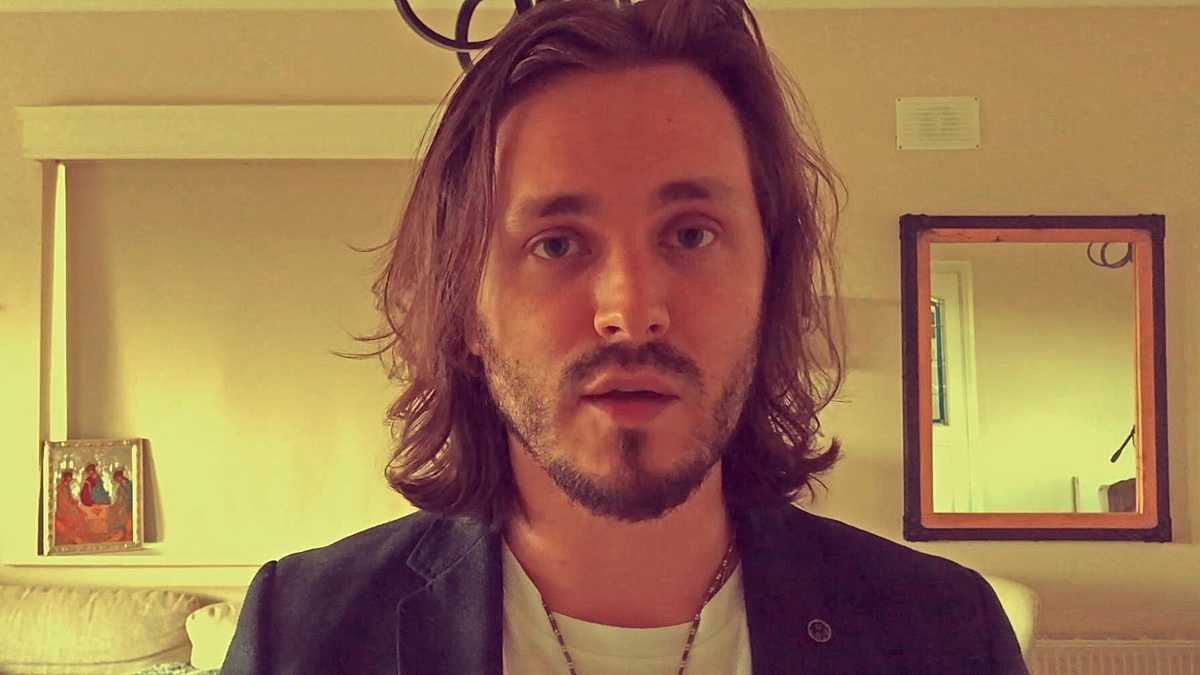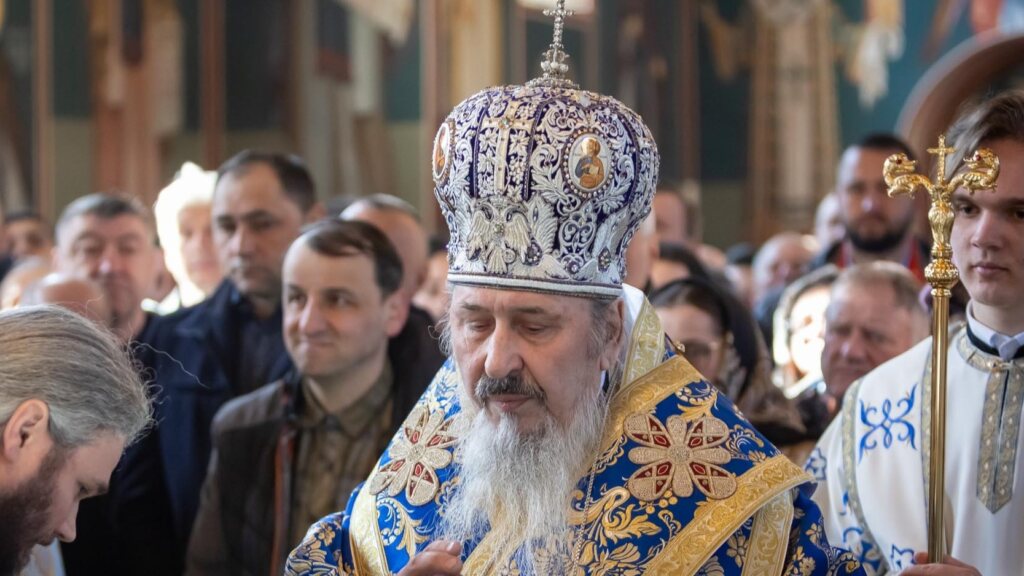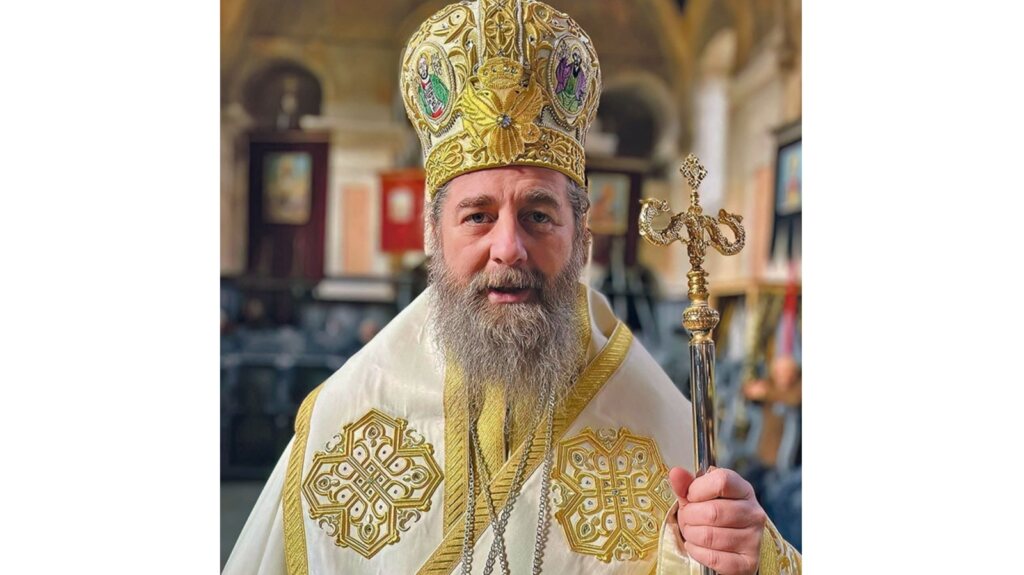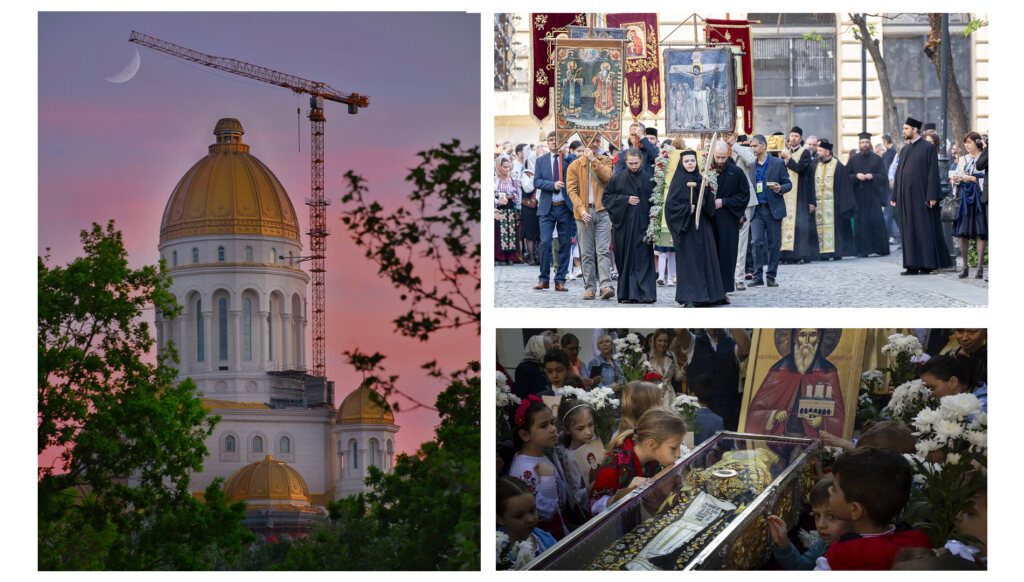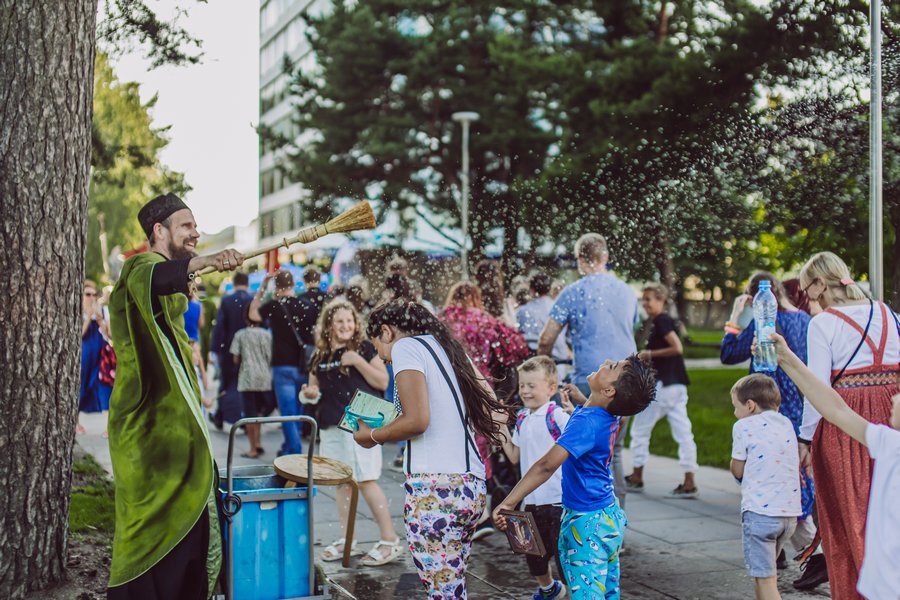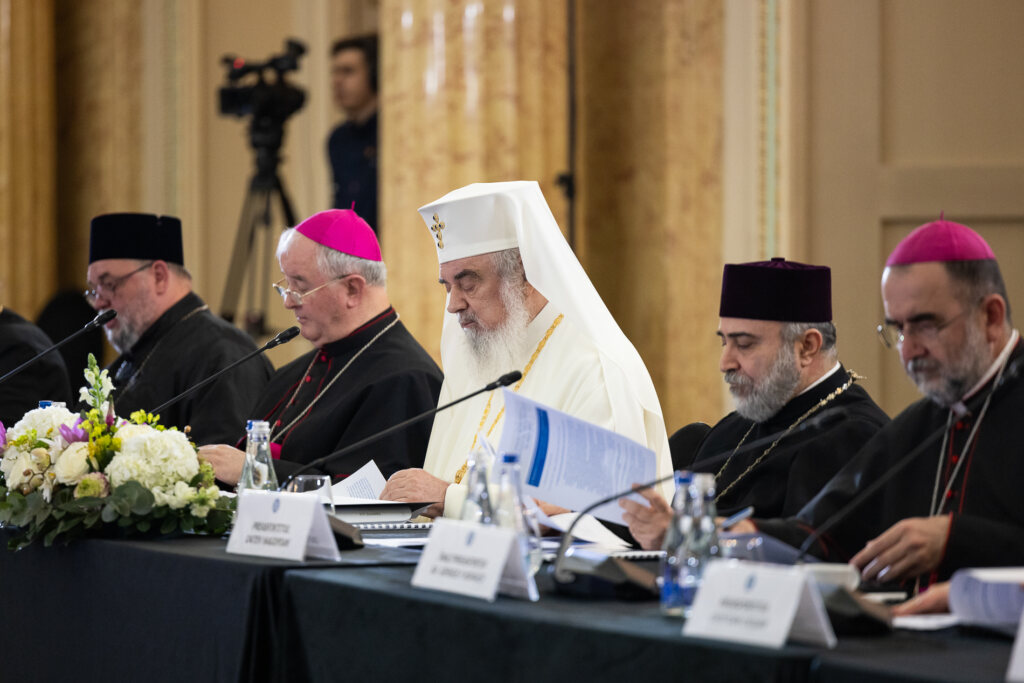Ideologies which are in conflict with the teachings of our faith cannot be opposed by another ideology – not even one of Christian nature. It would just further division in society. Only Christ unites us. Ideologies can only be combated with Christ’s humility and love, says Jonathan Jackson, American actor and singer who has converted to Orthodoxy after a trip to Romania.
He has offered an exclusive video interview for Basilica News Agency. Please read below the integral transcript.
Basilica.ro: Is pop-rock music a way to preach in today’s world? How to use it to reveal Orthodoxy to people?
Jonathan Jackson: It is a very good question and a difficult one to answer for me because there is a lot of nuance involved. I would say the first purpose of art is to awaken the heart and mind. It’s not so much to preach necessarily, but to reveal. There is a great mystery in the human heart in terms of how a person is drawn towards spiritual life, towards the mercy of Christ.
Sometimes, if artists are too focused on preaching, it can actually become a bit of a barrier for people to listen and have open hearts. But I do believe that artists should make songs and stories, they should paint pictures that are coming from the depth of who they are and the honesty of who they are.
And if that includes an artist who has experienced some of the beauty and mystery of Christ, that should absolutely naturally and organically come out.
We’ve seen this throughout history. Christ and the arts are very interconnected, they are sort of destined for each other.
Basilica.ro: You are never ashamed to confess your faith in a society which is rather hostile towards Christianity. Have you ever been ridiculed for your faith?
I think in our day and age there is an element of struggle and persecution that anyone who is vocally expressing their faith in Christ is going to experience their struggles. I think that would be someone in the entertainment industry, someone going to the university as a young adult, or it could be in a work environment.
Wherever you are surrounded by ideologies that are opposed to Christ and the Christian Revelation there is going to be tension. These things have occurred, but I don’t focus on them. Everybody has their journey and their reasons for these things. There is a lot on tension and a lot of pressure in our times.
I think the solution is not to fight the ideologies of the world with a Christianized ideology. The Revelation of Christ is not an ideology. It is the revelation of a personal God.
I think that we fight ideology with mercy and love, with grace and truth, but we don’t come back with our own ideology. That just furthers divisions between people.
Basilica.ro: What is your advice to those who avoid confessing their faith for this reason?
Jonathan Jackson: Huh, that is a tough question. I think that these things come down to falling in love with Christ on a personal level. Everything we do in our lives comes from this internal place that is a journey and sometimes it fluctuates.
But you know, one of the things I am reminded when thinking about this is that if and when, by the grace of God, we begin to have what the Scriptures talk about, the fear of the Lord – and this is not a humanistic being afraid of a wrathful petty deity, but the fear of the Lord speaks more to humility and wonder and being in awe.
A child has a certain healthy beautiful fear of their parents – not because they’re afraid of them, not because they’re afraid they are going to do anything mean to them – but just because, when a parent walks into the room, they’re much bigger and their voice is deeper and they know so much more.
So, when there is a healthy relationship between a parent and a child, the child has this holy fear. And is similar I think with the fear of the Lord.
When we fear men, we lose the fear of the Lord. And when we have this beautiful holy fear of the Lord, through the grace of the Holy Spirit, we no longer fear men, no longer care about what others think or say about us. So, I think there is something there in terms of asking the Holy Spirit to increase this holy and beautiful fear of the Lord.
Again, it’s personal love for Christ and we know that it’s not us who loved Him first. It’s He Who loved us first, as St John tells us in the Holy Scriptures. He loved us first. It’s a revelation of receiving the beauty and the goodness and the mercy and the love of Christ.
If we really believe that He voluntarily went to the Cross not only for the sins of the world, but personally for me and for you, as if no one else existed, that is how personal it was for Christ to take my sins upon Himself.
This Revelation births incredible love and gratitude and that is where I believe the Fathers of the Church and the saints show us that this is where courage comes from. It’s a revelation of the mercy and grace of God.
Basilica.ro: Is there a Romanian saint that you especially honour?
Jonathan Jackson: This is a wonderful question, because we have been part of a Romanian parish for the last year and it has been an incredible experience for myself and my family. I am just learning about some of the Romanian saints.
Interestingly enough, the two that have come to my mind are not officially canonized yet. nevertheless, I believe, like other hundreds of thousand people, that these holy people will be canonized: Father George Calciu and Elder Arsenie Boca.
I learned about Father George a few years ago and was so deeply overwhelmed by his story. I watched a documentary as well on his life and I’ve met some people who knew him. he is just an absolute incredible witness and saint in our times.
Just recently I was learning a bit about Father Arsenie and I was as well completely overwhelmed about what I was experiencing. The next time I went to the Divine Liturgy after reading about his life I experienced something very profound with him. There was so much grace present, so I’m actually very excited to know more about him and more of the Romanian saints.
A beautiful friend of ours has recently given us a list of Romanian saints for us to learn more about, so I’m excited about it.
Basilica.ro: What is your own patron saint and the patron saint of your family?
Jonathan Jackson: My patron saint is St John the Divine, or St John the Theologian and I have always had a very deep connection with him even before I understood the communion of saints. I grew up without this Revelation in my life, but I felt very close to St John because his Gospel was always my favourite growing up. I have always felt a deep connection with him and his letters that are as well in the Scriptures.
The closeness that St John has to the Mother of God is very mysterious and very powerful. Christ from the Cross saying to the Apostle John: Behold your mother. And saying to Mary: Behold your son.
There is quite a mystery there, so I feel like St John has helped me become closer to the Mother of God, because again I wasn’t raised with a veneration of Mary. So I’m very thankful for his prayers to help me approach Theotokos (the Mother of God – ed. note).
I feel very blessed and honoured to have been to her garden of the Holy Mountain many times now, which has also been an unspeakable blessing in experiencing the grace of the Mother of God.
We actually don’t have a saint of our family. St Nicholas the Wonderworker is the patron saint of our oldest son. St Anastasia the Martyr is the patron saint of our daughter. And St Titus the Apostle is the patron of our youngest son. St Elizabeth the New Martyr is my wife’s patron saint.
We do have an incredible icon that was made for us as a gift, which we cherish, with all of our saints on one icon.
We don’t have a family saint. Maybe we will someday.
Basilica.ro: We live in a time when political correctness is more and more dominant and affects Orthodox values. What is your position concerning this trend and what is your advice for Christians on the issue?
Jonathan Jackson: This is also touching on the divisiveness of our culture right now. This is very difficult, because there is a lot of nuance that needs to take place.
One of the difficulties with the new media, with social media is that people have lost the ability to have in-depth respectful conversation and dialogue and people have retreated to their ideological corners and basically just throw stones at each other.
I think it’s the role of Orthodox Christians to seek out the royal path. Christ is the One Who unites us. He is the Image of the invisible God and is also the icon of the true man, of true humanity.
This is something we need to hold on to. At the same time, Christ said: I’ve come with a sword. So there is something in holding to the truth that comes with a sword and we know this.
Generally speaking, I think political correctness has gone way out of hand and stifled freedom of speech and stifled many people’s ability to reach one another and that’s a huge problem.
But again, the answer to this problem is not to become militant and legalistic in spirit. Orthodox Christians should not adopt a pharisaic mentality to combat the difficulties that are occurring in the world.
We need to remain connected to the Holy Tradition and connected to the lives of the saints and the vision of the Fathers (of the Church – ed. note), which is that the Church is a hospital for the sick and what we experience in our journey of Salvation is Divine Therapy. You know, any of us who are without sin can go cast the first stone at the world.
We all have our own sins. One of the most beautiful things about Orthodoxy is that it teaches me to focus on my own need for God and my own repentance: Lord, Jesus Christ, the Son of God, have mercy on me, the sinner.
We pray before the Holy Communion every Sunday: we confess that I am the chief of sinners. This is what has been handed down to us.
One of the things that Elder Arsenie (Boca) said – and it’s echoing St Silouan and St Paisios, I think this is something that the saints of our times are beating the drum about, so to speak, and it’s very important for us to listen – is that humility is the highest virtue.
St Paisios echoes that, as I said, and St Silouan: Christ-like humility and love for one’s enemies. This is the only thing that is going to eventually reach people that are more and more – I would say – brainwashed and possessed by ideologies. This is what it’s going to pull people back from the herd mentality and the frenzy of ideology (which goes) in every direction: right, left, whatever direction it is…
What’s going to pull people back from this is Christ-like humility and love for one’s enemies. This is the beauty that Dostoevsky says would save the world.
It is my humble prayer that we maintain that Orthodox spirit, Orthodox being true glory. It is my humble prayer that we maintain this true glory of Christ-like humility and love for one’s enemies. You can’t fake that. This is where the real spiritual battle takes place. So, if we truly love our enemies and pray for those who persecute us and we don’t judge others but we do maintain truth, we do maintain Christian Revelation, then I think in the long run people will start to glimpse this beauty and perhaps maybe want that in their own lives.
We do need to be strong and unafraid but we also need to be wise: wise as the serpent and innocent as the dove, as our Lord says.
(Crosses himself) Forgive me for anything that I’ve said that is not from the Holy Spirit. I pray that God blesses you. And please pray for me as we continue to rejoice together in Christ’s victory over death.
Much love!
See also:
- Jonathan Jackson: My journey to Orthodoxy began with a paschal procession in Romania
- Rod Dreher: I had never felt closer to God than I have now as an Orthodox Christian
Photo credit: Screenshot
